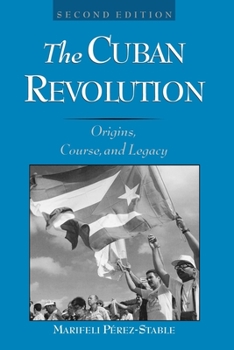The Cuban Revolution: Origins, Course, and Legacy, 2nd Edition
Select Format
Select Condition 
Book Overview
This timely and provocative study provides a reexamination of the achievements and failures of the Cuban revolution, placing it firmly within the context of twentieth century Cuban history. Beginning with the inauguration of the republic in 1902 and addressing Castro's triumphant entry into Santiago de Cuba in 1959, The Cuban Revolution highlights the factors which made Cuba susceptible to revolution, including its one-crop (sugar) economy and U.S. interference in Cuban affairs. While identifying nationalism and the struggle for social justice as the legitimate forces behind the revolution, P rez-Stable also provides insight into the problems facing Castro's Cuba. Arguing that the revolution actually ended in 1970, she blames its defeat on the regime's profitable yet doomed dependence on the Soviet Union. She further charges that Cuba's leaders failed to diversify the country's economy, to sustain development, or to create democratic institutions.
Now in its second edition, The Cuban Revolution has been updated to include an entirely new chapter on the changes affecting Cuba's policies and economy since the disintegration of the Soviet Union, and the failure of communism in general. The second edition also includes a new preface, an up-to-date bibliography, and a thoroughly revised concluding chapter summing up the prospects and possibilities of Cuba's future in the twenty-first century. Ideal for advanced undergraduate and graduate courses in Latin American history and politics, The Cuban Revolution offers students fresh insights into the successes and failures of the Cuban Revolution.
Now in its second edition, The Cuban Revolution has been updated to include an entirely new chapter on the changes affecting Cuba's policies and economy since the disintegration of the Soviet Union, and the failure of communism in general. The second edition also includes a new preface, an up-to-date bibliography, and a thoroughly revised concluding chapter summing up the prospects and possibilities of Cuba's future in the twenty-first century. Ideal for advanced undergraduate and graduate courses in Latin American history and politics, The Cuban Revolution offers students fresh insights into the successes and failures of the Cuban Revolution.
Format:Paperback
Language:English
ISBN:0195127498
ISBN13:9780195127492
Release Date:December 1998
Publisher:Oxford University Press
Length:288 Pages
Weight:0.95 lbs.
Dimensions:0.6" x 6.1" x 9.2"
Customer Reviews
3 ratings
The best single volume account
Published by Thriftbooks.com User , 14 years ago
Pérez Stable has done a masterful job. My students like the book for its fairness and balance.Her historical chapters present a more nunaced view of prerevolutionary Cuba than is usually the case. I recommend it for class adoption.
A Good Book for anyone trying to understand the Revolution
Published by Thriftbooks.com User , 24 years ago
This book provides an excellent background to social dynamics in Cuba before, during and after the Cuban Revolution, and does a good job analyzing its causes and consequences. It is indeed a must for anyone trying to understand the Revolution. The right wing exile community in Florida will not like this book because it is one of the few that consciously tries to be objective, but that should not dissuade other readers from purchasing this book. It is a bit too crammed with charts and statistics in places, which makes it cumbersome, but those sections are skimmable. I will certainly use it in my undergraduate classes.
Excellent Anaylsis of the Cuban Revolution
Published by Thriftbooks.com User , 26 years ago
Perez-Stable traces magnificantly the origins and failures of the Cuban revolution to underlying currents in Cuban history. This multifaceted work places an emphasis on the impact of a monocultural sugar economy, and the Imperialist legacy of the United States in the formation of a revolutionary atmosphere in Cuba. She incorporates numerous statistics and raw data to justify her claims. Though impeccably researched, the "Cuban Revolution" is at times difficult to read. The sheer thoroughness of the work at certain points overwhelms the reader, and clouds the lucidity of the work. Nevertheless, the excellent research outshines its periodic unintelligibility, especially in its institutional analysis of Castro's regime's. The book offers a new insight into the functions and paralysis of Cuban political institutions under Castro. In addition, the "Cuban Revolution" makes an important contribution to understanding of womens' role in Castro's consolidation of power. This is a must read for any serious student of Cuban History or Latin American Studies.






